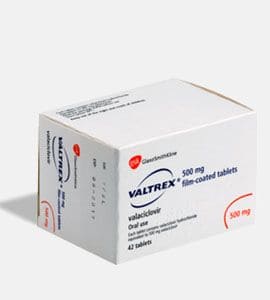Common use
Valtrex is an antiviral drug which used to treat certain herpes infections, including herpes zoster (the painful rash known as shingles), genital herpes, and herpes cold sores on the face and lips. Valtrex stops viral replication and combats the herpes virus attacking it and slowing it down from replicating itself in the system allowing the body to assist in the natural defence of the spread of this virus ultimately limiting both the duration and frequency of outbreaks. Valtrex will not cure herpes, it just lessens the symptoms of the infection.
Dosage and direction
Consult with your doctor before using. Use no more than was prescribed. Take it orally with or without food every 8 hours ( 3 times a day) for one week. If you have genital herpes take it twice daily for 5 days. For the treatment of cold sores, this drug is usually taken only for one day. For best result start treatment as soon as possible after your symptoms start. Note: this instruction presented here just for review. It's very necessary to consult with your doctor before using. It helps you to get the best results.
Precautions
The drug should not be used by patients with immune system problems. If you have HIV infection or had a bone marrow or kidney transplantation, Valtrex may threaten your life. Valtrex, when taken in appropriate doses each day, can reduce the risk of passing on genital herpes to sexual partners. Use it in combination with safer sex practices for best result. Valtrex should not be used during pregnancy, becoming pregnant or lactating without doctor's advice. Do not use Valtrex before breast-feeding without doctor's advice.
Contraindications
Valtrex is not allowed in people with kidney disease or blood disorders. Also, it is contraindicated in people who are hypersensitive to any components of this drug.
Possible side effect
They may include an allergic reaction: hives; difficulty breathing; swelling of your face, lips, tongue, or throat. Also, the most possible side effects include pain in your lower back; drowsiness, mood changes, increased thirst, loss of appetite, nausea and vomiting; swelling, weight gain, feeling short of breath; confusion, agitation, aggression, hallucinations, trouble concentrating; feeling shaky or unsteady; problems with speech or vision; seizure (convulsions). Less serious include: nausea, stomach pain; headache, dizziness, tired feeling, depression; joint pain; menstrual pain; mild skin rash; stuffy nose, sore throat. This kinds of side effect can harm red blood cells: fever, easy bruising or bleeding; red spots on the skin (not related to herpes or chickenpox); bloody diarrhoea, vomiting; pale or yellowed skin; weakness or fainting; urinating less than usual or not at all. If you experience one of them stop using Valtrex and tell your doctor as soon as possible. Also, consult with your doctor about any side effect that seems unusual.
Drug interaction
Valtrex interact with Probenecid (Benemid) and cimetidine (Tagamet, Tagamet HB). Also, note that the interaction between two medications does not always mean that you must stop taking one of them. As usual, it affects the effect of drugs, so consult with your doctor about how their interactions are being managed or should be managed.
Missed dose
If you forgot to take your dose in time, please do it as soon as you remember. But do not take if it is too late or almost time for your next dose. Do not take double or extra doses. Take your usual dose next day in the same regularly time.
Overdose
Symptoms of Valtrex overdose are not known. So if you experience any unusual symptom call your doctor immediately.
Storage
Store at room temperature between 59-77 degrees F (15-25 degrees C) away from light and moisture, kids and pets. Do not use after expiration term.






